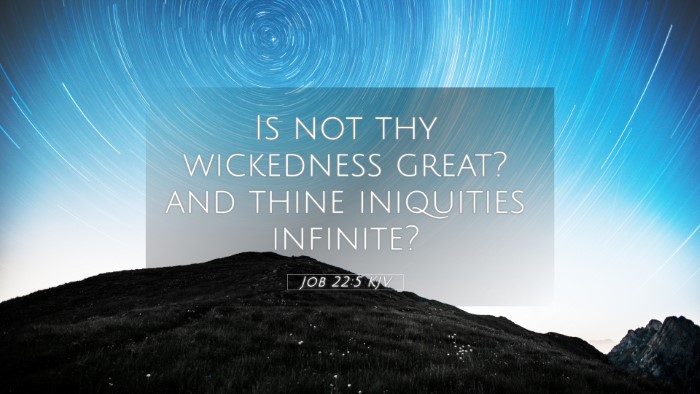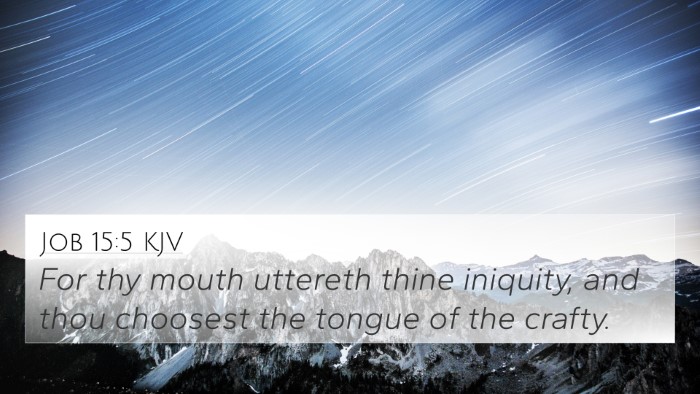Old Testament
Genesis Exodus Leviticus Numbers Deuteronomy Joshua Judges Ruth 1 Samuel 2 Samuel 1 Kings 2 Kings 1 Chronicles 2 Chronicles Ezra Nehemiah Esther Job Psalms Proverbs Ecclesiastes Song of Solomon Isaiah Jeremiah Lamentations Ezekiel Daniel Hosea Joel Amos Obadiah Jonah Micah Nahum Habakkuk Zephaniah Haggai Zechariah MalachiJob 22:5 Similar Verses
Job 22:5 Cross References
Is not thy wickedness great? and thine iniquities infinite?
Uncover the Rich Themes and Topics of This Bible Verse
Listed below are the Bible themes associated with Job 22:5. We invite you to explore each theme to gain deeper insights into the Scriptures.
Job 22:5 Cross Reference Verses
This section features a detailed cross-reference designed to enrich your understanding of the Scriptures. Below, you will find carefully selected verses that echo the themes and teachings related to Job 22:5 KJV. Click on any image to explore detailed analyses of related Bible verses and uncover deeper theological insights.

Job 4:7 (KJV) »
Remember, I pray thee, who ever perished, being innocent? or where were the righteous cut off?

Job 11:14 (KJV) »
If iniquity be in thine hand, put it far away, and let not wickedness dwell in thy tabernacles.

Job 21:27 (KJV) »
Behold, I know your thoughts, and the devices which ye wrongfully imagine against me.
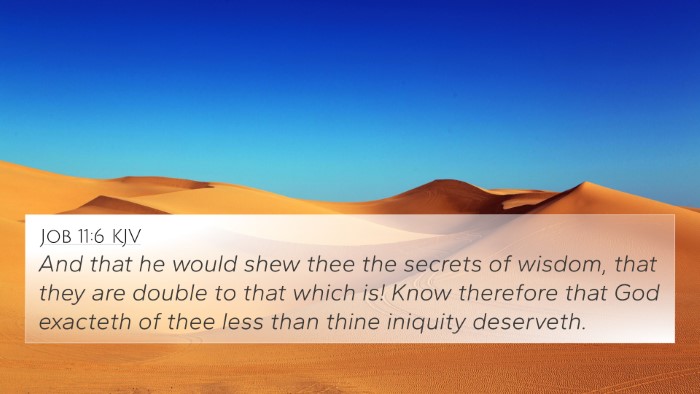
Job 11:6 (KJV) »
And that he would shew thee the secrets of wisdom, that they are double to that which is! Know therefore that God exacteth of thee less than thine iniquity deserveth.
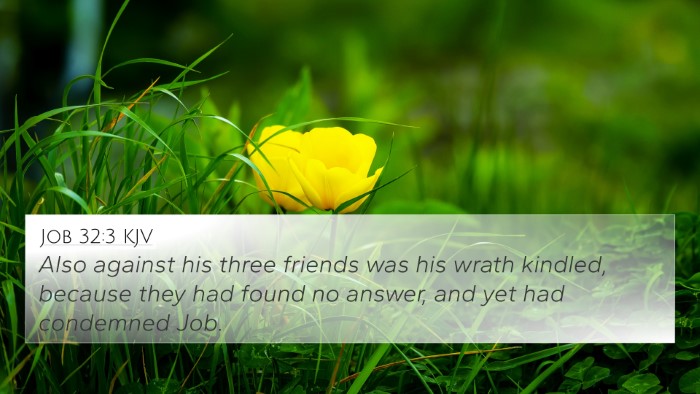
Job 32:3 (KJV) »
Also against his three friends was his wrath kindled, because they had found no answer, and yet had condemned Job.
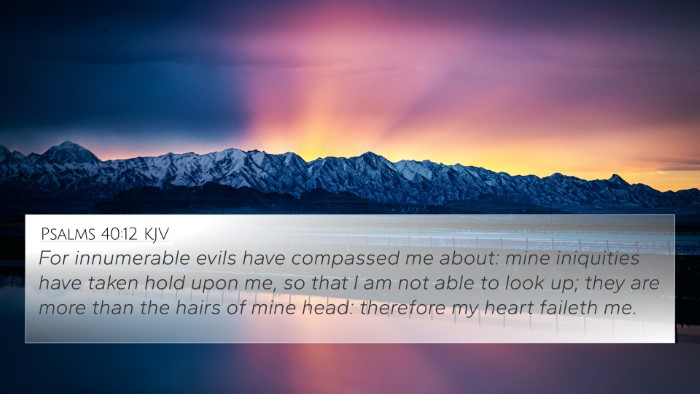
Psalms 40:12 (KJV) »
For innumerable evils have compassed me about: mine iniquities have taken hold upon me, so that I am not able to look up; they are more than the hairs of mine head: therefore my heart faileth me.
Job 22:5 Verse Analysis and Similar Verses
Understanding Job 22:5
Job 22:5 states: "Is not your wickedness great, and your iniquities without end?" This verse comes from a discourse by Eliphaz the Temanite, who is one of Job's three friends. They come to comfort Job after he suffers immense loss, but they end up accusing him of wrongdoing. In this verse, Eliphaz implies that Job's suffering is a result of his sinfulness.
Insights from Public Domain Commentaries
Matthew Henry Commentary: Henry critiques Eliphaz's position, highlighting that it suggests a lack of compassion. He emphasizes that the impulse of the friend in questioning Job's morality reflects a misunderstanding of divine justice. Eliphaz assumes that all suffering arises from individual sin, rigidity in understanding God's ways.
Albert Barnes' Notes on the Bible: Barnes elaborates on the idea of wickedness in this context. He explains that Eliphaz is addressing Job's moral character, asserting that his troubles directly correlate to an underlying sin. Barnes indicates the broader theological implication—namely, that suffering does not always equate to divine punishment but can serve a purpose beyond human comprehension.
Adam Clarke's Commentary: Clarke makes the observation that friends often misconstrue the suffering of the righteous. He points out that while Eliphaz questions Job's integrity, it is important for readers to realize that suffering is an element of the human experience, not simply a marker of one's relationship with God. Clarke encourages an understanding that divine providence can manifest in various forms.
Connections between Job 22:5 and Other Bible Verses
To deepen our understanding of Job 22:5, we can explore several Bible verses that reflect similar themes of suffering, sin, and divine justice. Here are some key cross-references:
- Proverbs 14:34 - "Righteousness exalts a nation, but sin is a reproach to any people."
- Psalm 32:5 - "I acknowledged my sin to you, and I did not cover my iniquity; I said, 'I will confess my transgressions to the Lord,' and you forgave the iniquity of my sin."
- John 9:1-3 - "As he passed by, he saw a man blind from birth. And his disciples asked him, 'Rabbi, who sinned, this man or his parents, that he was born blind?' Jesus answered, 'It was not that this man sinned, or his parents, but that the works of God might be displayed in him.'
- James 5:11 - "Behold, we consider those blessed who remained steadfast. You have heard of the steadfastness of Job, and you have seen the purpose of the Lord, how the Lord is compassionate and merciful."
- Isaiah 53:5 - "But he was pierced for our transgressions; he was crushed for our iniquities; the punishment that brought us peace was on him, and by his wounds, we are healed."
- Romans 3:23 - "For all have sinned and fall short of the glory of God."
- Hebrews 12:5-6 - "And have you forgotten the exhortation that addresses you as sons? 'My son, do not regard lightly the discipline of the Lord, nor be weary when reproved by him. For the Lord disciplines the one he loves, and chastises every son whom he receives.'
Comparative Analysis of Themes
The verse highlights the theme of righteousness versus sinfulness, echoing in many scriptures. Job's predicament forces readers to ponder the often-complex relationship between human suffering and divine justice—an exploration seen through these cross-references:
- Job's assertion of innocence against the accusation of wickedness reflects the principles discussed in Luke 1:6, where the characters are described as blameless.
- The illustration of human sinfulness in 1 John 1:8 further develops the theme, "If we say we have no sin, we deceive ourselves and the truth is not in us."
- Job's conversation with Eliphaz parallels the rich young ruler in Matthew 19:16-22, who believes his good deeds protect him from judgment while the underlying sin remains unacknowledged.
Theological Implications
Job 22:5 can be a catalyst for broader discussions on the nature of divine justice. The portrayals in this discourse lead us to consider:
- The understanding of sin as a universal human condition, not strictly individual punishment.
- The complexity of God’s relationship with humanity—how hardship can serve as a precursor to growth and reliance on God.
- The assurance that trials can also be designed for divine purposes, as seen later in the New Testament.
Tools for Further Study
To engage deeply with these themes and connections, utilizing Bible cross-reference guides can be invaluable. Here are tools that can aid in your study:
- Utilizing a Bible concordance to identify key themes related to sin and suffering.
- Engaging with cross-referencing Bible study methods to connect verses that address moral and ethical quandaries.
- Exploring different Bible reference resources for varied translations and interpretations of the text.
Conclusion
In summary, Job 22:5 invites readers to engage profoundly with the connections between human suffering and divine justice. Eliphaz's accusations against Job serve as a springboard for exploring core biblical themes of sin, righteousness, and the purpose behind suffering. By cross-referencing scriptures, readers can gain a more holistic understanding of these issues and appreciate the intricate tapestry of the Biblical narrative.

